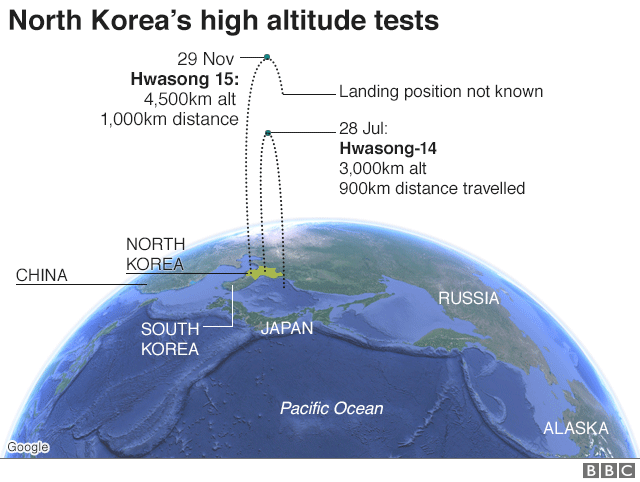In a tweet, Mr Trump said the vote proved the world “wants peace, not death”.
The US-drafted resolution includes measures to slash North Korea’s petrol imports by up to 90%.
China and Russia, Pyongyang’s main trading partners, voted in favour of the resolution.
North Korea is already subject to a raft of sanctions from the US, the UN and the EU.
 “The United Nations Security Council just voted 15-0 in favor of additional Sanctions on North Korea. The World wants Peace, not Death!” Mr Trump tweeted.
“The United Nations Security Council just voted 15-0 in favor of additional Sanctions on North Korea. The World wants Peace, not Death!” Mr Trump tweeted.
The US ambassador to the UN, Nikki Haley, said the sanctions sent an “unambiguous message to Pyongyang that further defiance will invite further punishments and isolation”.
She described North Korea as “the most tragic example of evil in the modern world”.
UK Foreign Secretary Boris Johnson said the latest measures against North Korea were a “vital step” towards curbing its nuclear weapons programme.
He said the international community had shown it was united in its condemnation of the North’s “reckless behaviour”.
The Chinese foreign ministry described the situation on the peninsula as “complex and sensitive” and called on all sides to “exercise restraint and make active efforts to ease tensions”.
What exactly are the new sanctions?
The US said it was seeking a diplomatic solution to the issue and drafted this new set of sanctions:
- Deliveries of petrol products will be capped at 500,000 barrels a year, and crude oil at four million barrels a year
- All North Korean nationals working abroad will have to return home within 24 months under the proposals, restricting a vital source of foreign currency
- There will also be a ban on exports of North Korean goods, such as machinery and electrical equipment
Tensions have risen this year over North Korea’s nuclear and missile programmes, which it has pursued despite pressure from world powers.
The UN sanctions came in response to Pyongyang’s 28 November firing of a ballistic missile, which the US said was its highest yet.
Mr Trump has previously threatened to “totally destroy” North Korea if it launches a nuclear attack. North Korean leader Kim Jong-un has described the US president as “mentally deranged”.
What about previous sanctions?
Last month, the US unveiled fresh sanctions against North Korea which it said were designed to limit the funding for its nuclear and ballistic missile programmes.
The measures targeted North Korean shipping operations and Chinese companies that trade with Pyongyang.
The UN also approved new sanctions following North Korea’s nuclear test on 3 September.
These measures restricted oil imports and banned textile exports – an attempt to starve the North of fuel and income for its weapons programmes.

What effect have previous sanctions had?
The US has been imposing sanctions on North Korea for more than a decade with little success.
In fact, North Korea has said fresh sanctions will only make it accelerate its nuclear programme. It has continued to test nuclear and ballistic missiles despite these recent examples of UN pressure:
- 30 November 2016: UN targeted North Korea’s valuable coal trade with China, slashing exports by about 60% under a new sales cap. Exports of copper, nickel, silver, zinc and the sale of statues were also banned
- What happened next? On 14 May 2017, North Korea tested what it said was a “newly developed ballistic rocket” capable of carrying a large nuclear warhead
- 2 June 2017: UN imposed a travel ban and asset freeze on four entities and 14 officials, including the head of North Korea’s overseas spying operations
- What happened next? On 4 July, North Korea claimed it had carried out its first successful test of an intercontinental ballistic missile (ICBM)
- 6 August 2017: UN banned North Korean exports of coal, ore and other raw materials and limited investments in the country, costing Pyongyang an estimated $1bn – about a third of its export economy
- What happened next? On 3 September, North Korea said it had tested a hydrogen bomb that could be miniaturised and loaded on a long-range missile.
